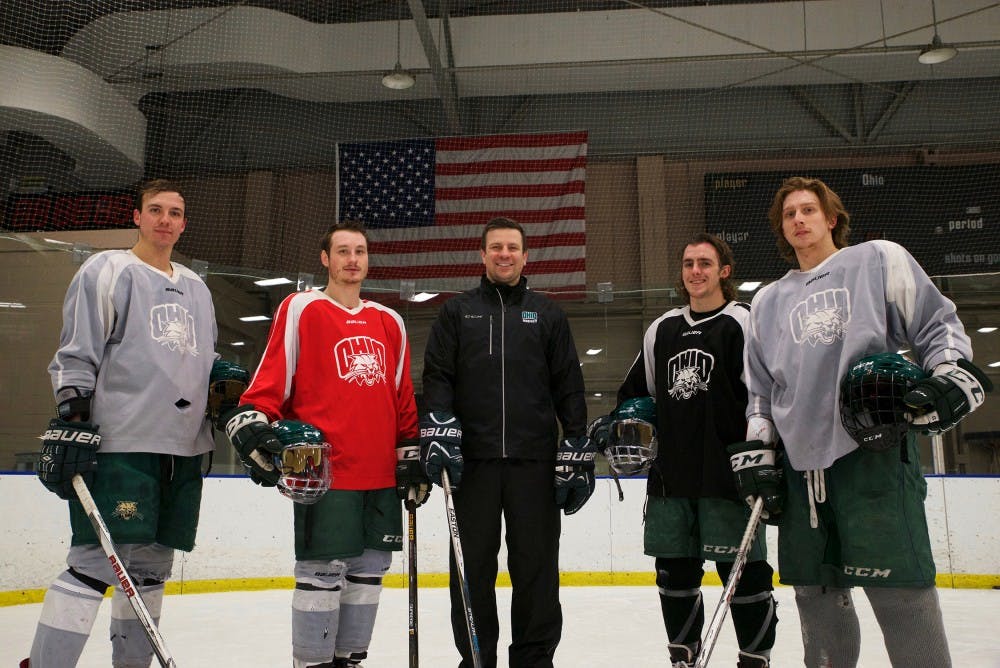On the last night of Team USA’s trip to Kazakhstan for the World University Games, coach Sean Hogan surveyed a large barbecue buffet and grabbed a few of the offerings, including one he thought was pork.
He took a bite. It wasn’t pork.
“I was like, ‘What is that?’” Hogan said. “The (worker) told me in Russian and I said, ‘Horse?’”
Hogan had tried to avoid horse, a common meal in Kazakhstan, for the entire two-week trip. He said eating it upset his stomach. Defenseman Mike LaFrenier gave it a try and wasn’t as turned off.
“Nothing that I had to spit out, so that’s good,” LaFrenier said.
The food was just one of many new experiences in store for Ohio’s five members who represented Team USA at the World University Games in Almaty, Kazakhstan. They were exposed to a new culture while playing in something comparable to a mini-Olympics.
Hogan, LaFrenier and forwards Matt Hartman, Joey Breslin and Matt Rudin took a unique trip to Almaty, a city of 1.7 million people in southeast Kazakhstan, located 220 miles west of China.
Something was different the minute they got off the plane. Hogan said you could taste the air.
“And everyone was like, are people smoking inside?” Rudin said. “But then they just told us about how bad the smog is in the city.”
Then came the police escorts, which whisked the team from the airport to the athlete’s village as well as to and from the arena every day. The military and security presence was constant throughout the trip.
LaFrenier said he noticed at least a few years of technological gap between Kazakhstan and the U.S. when he saw bright yellow oil pipes above the ground in neighborhoods the team drove by. He heard that cars had hit some of the pipes in the past and exploded.
In the athlete’s village, Team USA had its own building of dorm rooms, which was attached to Team Canada’s building.
But the players had such busy schedules — between practices, games, supporting the U.S. women’s hockey team, touring the area, etc. — that there was little time to mingle with people from other countries.
The exception was the dining area, where athletes from the 56 represented countries ate together and took part in some international commerce.
All participants at the World University Games received items, such as winter clothing, that featured their country’s name. They had enough to spare, which led to lots of trading.
Proud of @BobcatsHockey representing at the @usahockey ceremonies in Kazakhstan! @OU_BirdArena pic.twitter.com/jVtiyeMq6J
— OU Campus Recreation (@OU_CampusRec) February 13, 2017
Hogan traded for a Slovenia jacket. Rudin scored a parka and a hoodie from Sweden, as well as fleece zip-ups from Korea, Russia and China.
“I feel like everyone wanted something that had USA on it,” Rudin said.
On the ice, Team USA played five games and finished 3-2. After losing 6-0 to Canada and 4-1 to Slovakia, the U.S. came back with three blowout wins: 10-1 over Great Britain, 17-1 against China and 10-1 over Great Britain again.
The U.S. finished ninth out of twelve teams. Russia defeated the host Kazakhstan in the gold medal game.
The competition was a tale of two types of countries — ones with former professional players and ones without.
China and Britain had rosters of amateur-level players like Team USA. Hogan said he typically wouldn’t run up the score like the U.S. did against those countries, but goal differential impacted the standings.
The Canadians, on the other hand, had five players with experience in the East Coast Hockey League, a pro league two steps below the NHL. Canada, which finished with the bronze medal, was the strongest and fastest team the Americans faced. But their refined skills also stood out.
“Just the patience, that extra second to turn their wrist a different way,” LaFrenier said. “They’re more mature through their years and used to playing a higher-level opponent.”
The game atmosphere was professional quality, too. Hogan said that of the three World University Games he’s been to. He was a Team USA assistant coach in 2013 and 2015, but this was the most organized.
“Every game was packed,” he said, which reflects the 2,400+ fans Team USA averaged at its five games. “Beautiful facilities, athlete’s village was very nice. It was a great experience.”
As they flew back to Chicago, players passed the time by sleeping, listening to music, playing games on their phones and watching movies. Rudin, who is studying marine biology, was particularly interested in a film called Salmon Fishing in The Yemen.
But the travel across 11 time zones takes a toll and is a difficult adjustment. Hogan said it took a week for him to adjust in Kazakhstan and another week to adjust back to the U.S.
Playing hockey in Central Asia at the expense of USA Hockey was a positive experience for the Bobcats, yet a few oddities — namely smog and the prevalence of horse meat — gave Hogan a chance to reflect on his home country.
“Being there makes me realize how lucky we are to live in the U.S. for sure,” he said.






